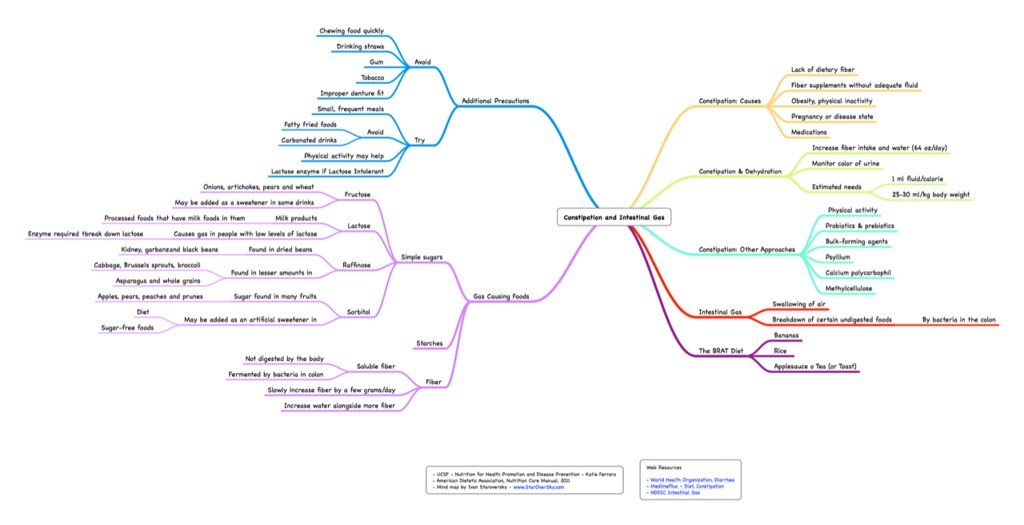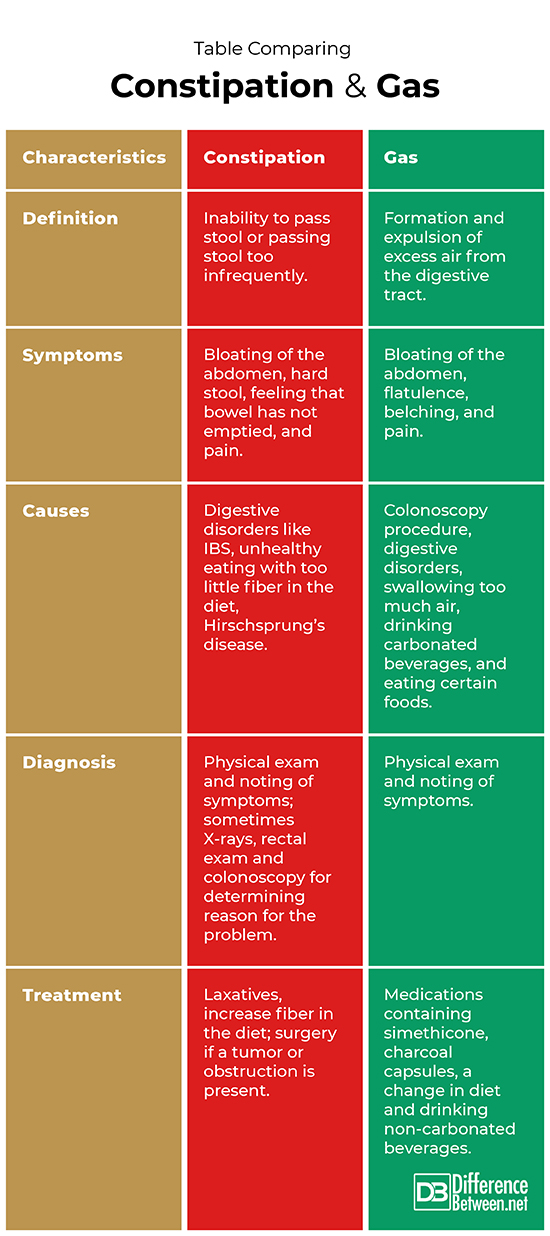Difference Between Constipation and Gas
Constipation is when stool cannot be passed regularly or is passed only with difficulty. Gas is when air accumulates in the digestive tract.

What is Constipation?
Definition:
Constipation is the condition is when stool is difficult to pass or is not passed often enough.
Symptoms:
Symptoms of constipation include not having a bowel movement within at least three days, passing hard stools, bloating of the abdomen. Another symptom is having a sense that the bowel has not emptied properly. People may also feel pain in the abdomen as the constipation increases.
Causes:
The cause of constipation can range from not eating enough fiber to having a serious medical problem such as a bowel obstruction or a tumor in the rectum or the colon. Some constipation cases are due to motility problems of the colon, such as can occur in irritable bowel syndrome (IBS), or due to nerve cells that are missing in the colon as occurs in Hirschsprung’s disease. Certain drugs can also decrease colon transit time, meaning that the passage of stool through the bowel is slowed down, causing or aggravating constipation in people.
Diagnosis:
The diagnosis of constipation is based on taking a patient’s history. Sometimes X-ray images with contrast are used to check for intestinal obstructions. A rectal exam and colonoscopy can also be done to check for the presence of colon tumors that could be causing the constipation.
Treatment:
Treatment options for constipation depend on the cause of the condition. The presence of a tumor or other physical obstruction requires surgical intervention. Functional problems can be treated with medication, such as antispasmodics or laxatives. Laxatives can be either stool softeners or stimulant-type drugs. Stool softeners soften the stool making it easier to pass and stimulant-type drugs stimulate the muscles of the bowel to contract so as to push stool along.
Complications:
Constipation is a frequent cause of hemorrhoids, which are swollen veins either on the outside or inside of the anal canal. These can be painful and can bleed. An anal fissure, which is when the anal canal tears, can also occur due to straining from constipation. Fecal impaction can occur where feces harden and cannot be passed, requiring medical intervention.

What is Gas?
Definition:
The term gas is used to refer to air that is produced in the digestive tract and that is passed out of the body.
Symptoms:
It is normal for individuals to produce and pass gas but too much causes problems. A person that has excess gas in the intestinal tract often produces flatus and may also belch. The abdomen also often swells up and the person feels bloated. Excess amounts of trapped gas can be painful. Constipation can aggravate gas problems because it is harder to expel gas when the person is constipated. In fact, constipation and gas are often related problems associated with digestive problems.
Causes:
Gas is normally produced in the digestive system as a result of bacterial fermentation of the food. However, excess gas can result when a person eats difficult to digest food such as beans, or cruciferous vegetables such as cabbage, or if they have a digestive system disorder. Gas can be a problem after having a colonoscopy because air is often intentionally released into the colon during the procedure. People often unconsciously swallow air, which can cause gas, leading to belching. Drinking carbonated beverages also increases gas in the stomach.
Diagnosis:
Diagnosis is based on the patient complaining about the problem or a doctor noting the symptoms. Not passing any gas is a bad sign as it can indicate an obstruction, thus a careful history needs to be taken.
Treatment:
A change in diet where gas-producing foods are eliminated can help, and sometimes taking enzymes and probiotics improves the digestion of these problem foods. Sometimes, probiotics are helpful in restoring the balance of bacteria in the gut, which helps with gas. Avoiding drinking carbonated beverages is also helpful in reducing gas in the stomach. Charcoal capsules or drugs such as simethicone can help reduce gas build-up in the gut. Treating an underlying digestive disorder such as gastroesophageal reflux disease (GERD) may also reduce gas production.
Complications:
Gas does not lead to medical complications provided it is passed. The person may tend to socially isolate to avoid embarrassment, though, and may find it difficult to eat certain foods that other people have no issue with.
Difference between Constipation and Gas?
Definition
Constipation is the inability to pass stool or passing stool infrequently. Gas is the formation and expulsion of excess air from the digestive tract.
Symptoms
Bloating of the abdomen, hard stool, feeling that bowel has not emptied, and pain are all symptoms of constipation. Bloating of the abdomen, flatulence, belching, and pain are symptoms of gas.
Causes
Constipation can be caused by digestive disorders like IBS, unhealthy eating with too little fiber in the diet, or by having Hirschsprung’s disease. Gas can be caused by a colonoscopy procedure, digestive disorders, swallowing too much air, drinking carbonated beverages, and eating certain foods.
Diagnosis
Diagnosis of constipation is by physical exam along with patient history; X-rays, rectal exam and colonoscopy are sometimes done. Gas is diagnosed by physical exam and patient history.
Treatment
Laxatives, increasing the amount of fiber in the diet and surgery (if a tumor or obstruction is present) are treatment options for constipation. Medications containing simethicone, charcoal capsules, a change in diet and drinking non-carbonated beverages are treatment options for gas.
Table comparing Constipation and Gas

Summary of Constipation Vs. Gas
- Constipation and gas are both problems related to the digestive system.
- Constipation and gas are related, with constipation worsening gas problems.
- Digestive disorders can cause both gas and constipation to occur.
- Difference Between Rumination and Regurgitation - June 13, 2024
- Difference Between Pyelectasis and Hydronephrosis - June 4, 2024
- Difference Between Cellulitis and Erysipelas - June 1, 2024
Search DifferenceBetween.net :
Leave a Response
References :
[0]Gotfried, Jonathan. “ Constipation.” Merckmanuals. Merck & Co., 2020,https://www.msdmanuals.com/professional/gastrointestinal-disorders/symptoms-of-gastrointestinal-disorders/constipation
[1]Gotfried, Jonathan. “ Gas-related Complaints” Merckmanuals. Merck & Co., 2020,https://www.msdmanuals.com/professional/gastrointestinal-disorders/symptoms-of-gastrointestinal-disorders/gas-related-complaints?query=gas
[2]Mayo Clinic. “Constipation.” Mayo Clinic. Mayo Clinic, 2021, https://www.mayoclinic.org/diseases-conditions/constipation/symptoms-causes/syc-20354253
[3]Image credit: https://live.staticflickr.com/7295/10701873316_15ea43068e_b.jpg
[4]Image credit: https://live.staticflickr.com/3057/2298394078_444f913939_b.jpg
